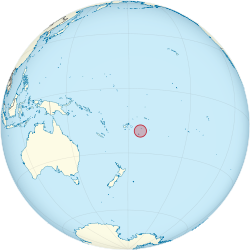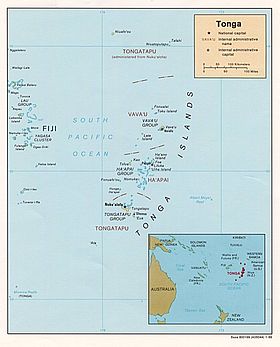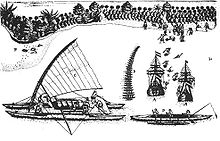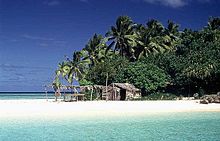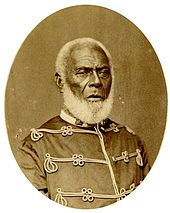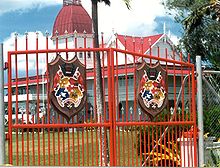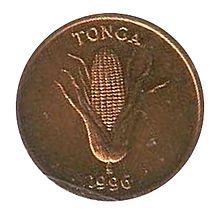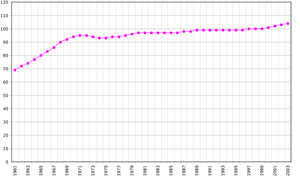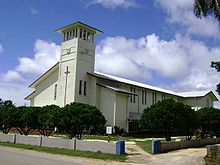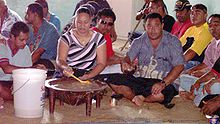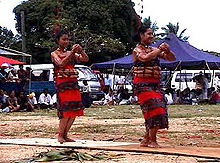
Tonga
Background to the schools Wikipedia
This selection is made for schools by a children's charity read more. SOS Children is the world's largest charity giving orphaned and abandoned children the chance of family life.
| Kingdom of Tonga Puleʻanga Fakatuʻi ʻo Tonga
|
||||||
|---|---|---|---|---|---|---|
|
||||||
| Motto: "Ko e ʻOtua mo Tonga ko hoku tofiʻa" "God and Tonga are my Inheritance" |
||||||
| Anthem: Ko e fasi ʻo e tuʻi ʻo e ʻOtu Tonga The Song of the King of the Tongan Islands |
||||||
|
|
||||||
|
|
||||||
| Capital and largest city |
Nukuʻalofa 21°08′S 175°12′W |
|||||
| Official languages |
|
|||||
| Demonym | Tongan | |||||
| Government | Unitary parliamentary constitutional monarchy | |||||
| - | King | Tupou VI | ||||
| - | Prime Minister | Sialeʻataongo Tuʻivakanō | ||||
| Legislature | Legislative Assembly | |||||
| Independence | ||||||
| - | from British protection | June 4, 1970 | ||||
| Area | ||||||
| - | Total | 748 km2 ( 186th) 289 sq mi |
||||
| - | Water (%) | 4.0 | ||||
| Population | ||||||
| - | 2011 census | 103,036 | ||||
| - | Density | 139/km2 ( 76tha) 360/sq mi |
||||
| GDP ( PPP) | 2011 estimate | |||||
| - | Total | $763 million | ||||
| - | Per capita | $7,344 | ||||
| GDP (nominal) | 2011 estimate | |||||
| - | Total | $439 million | ||||
| - | Per capita | $4,220 | ||||
| HDI (2013) | medium · 95th |
|||||
| Currency | Paʻanga ( TOP) |
|||||
| Time zone | ( UTC +13) | |||||
| DST not observed | ||||||
| Drives on the | left | |||||
| Calling code | +676 | |||||
| ISO 3166 code | TO | |||||
| Internet TLD | .to | |||||
| a. | Based on 2005 figures. | |||||
Tonga ( [ˈtoŋa]; Tongan: Puleʻanga Fakatuʻi ʻo Tonga), officially the Kingdom of Tonga, is a sovereign state and an archipelago comprising 176 islands scattered over 700,000 square kilometres (270,000 sq mi) of the southern Pacific Ocean. Fifty-two of these islands are inhabited.
Lengthwise, the Kingdom stretches over a distance of about 800 kilometres (500 mi) in a north-south line located about a third of the distance from New Zealand to Hawaii.
Tonga also became known as the Friendly Islands because of the friendly reception accorded to Captain James Cook on his first visit there in 1773. He happened to arrive at the time of the ʻinasi festival, the yearly donation of the first fruits to the Tuʻi Tonga (the islands' paramount chief) and so received an invitation to the festivities. According to the writer William Mariner, the chiefs had wanted to kill Cook during the gathering, but could not agree on a plan.
Tonga is the only island nation in the region to have avoided formal colonisation. In 2010, it took a decisive step towards becoming a fully functioning constitutional monarchy, after legislative reforms paved the way for its first partial representative elections.
Etymology
In many Polynesian languages, Tongan included, the word tonga means "south", as the archipelago is the southernmost group of islands of central Polynesia. In Tongan, the name is pronounced as [ˈtoŋa], and it is commonly pronounced as / ˈ t ɒ ŋ ə / or / ˈ t ɒ ŋ ɡ ə / in English. The name of Tonga is cognate to the Hawaiian region of Kona.
History
An Austronesian-speaking group linked to the archaeological construct known as the Lapita cultural complex reached and colonised Tonga around 1500–1000 BCE. Scholars have much debated the exact dates of the initial settlement of Tonga, but recently it has been thought that the first settlers came to the oldest town Nukuleka about 826 BCE, ± 8 years. Not much is known about Tonga before European contact because of the lack of a writing system. However, oral history has survived and been recorded after the arrival of the Europeans. The Tongan people first encountered Europeans in 1616 when the Dutch vessel Eendracht made a short visit to the islands to trade.
By the 12th century Tongans, and the Tongan paramount chief, the Tuʻi Tonga, had a reputation across the central Pacific—from Niue, Samoa, Rotuma, Wallis & Futuna, New Caledonia to Tikopia—leading some historians to speak of a Tuʻi Tonga Empire. In the 15th century and again in the 17th, civil war erupted. Into this situation the first European explorers arrived, beginning in 1616 with the Dutch explorers Willem Schouten and Jacob Le Maire (who called on the northern island of Niuatoputapu), and in 1643 with Abel Tasman (who visited Tongatapu and Haʻapai). Later noteworthy European visitors included James Cook (British Navy) in 1773, 1774, and 1777, Alessandro Malaspina (Spanish Navy) in 1793, the first London missionaries in 1797, and the Wesleyan Methodist Rev. Walter Lawry in 1822.
In 1845 the ambitious young warrior, strategist, and orator Tāufaʻāhau united Tonga into a kingdom. He held the chiefly title of Tuʻi Kanokupolu, but had been baptised with the name Jiaoji ("George") in 1831. In 1875 with the help of missionary Shirley Waldemar Baker, he declared Tonga a constitutional monarchy, formally adopted the western royal style, emancipated the "serfs", enshrined a code of law, land tenure, and freedom of the press, and limited the power of the chiefs.
Tonga became a British- protected state under a Treaty of Friendship on 18 May 1900, when European settlers and rival Tongan chiefs tried to oust the second king. Within the British Empire, which posted no higher permanent representative on Tonga than a British Consul (1901–1970), Tonga formed part of the British Western Pacific Territories (under a colonial High Commissioner, residing on Fiji) from 1901 until 1952. Although under the protection of Britain, Tonga remained the only Pacific nation never to have given up its monarchical government—as did Tahiti and Hawaiʻi. The Tongan monarchy follows an uninterrupted succession of hereditary rulers from one family. In 1918 the influenza epidemic that spread through the world caused the deaths of 1,800 people in Tonga, approximately 8% of the population.
The Treaty of Friendship and Tonga's protectorate status ended in 1970 under arrangements established by Queen Salote Tupou III prior to her death in 1965. Tonga joined the Commonwealth of Nations in 1970 (atypically as an autochthonous monarchy, that is one with its own local monarch rather than that of the United Kingdom—compare Malaysia, Lesotho, and Swaziland), and became a member of the United Nations in September 1999. While exposed to colonial pressures, Tonga has never lost indigenous governance, a fact that makes Tonga unique in the Pacific and gives Tongans much pride, as well as confidence in their monarchical system. As part of cost cutting measures across the British Foreign Service, the British Government closed the British High Commission in Nukuʻalofa in March 2006, transferring representation of British interests in Tonga to the UK High Commissioner in Fiji. The last resident British High Commissioner was Paul Nessling.
Geography
Administratively, Tonga sub-divides into five divisions: ʻEua, Haʻapai, Niuas, Tongatapu, and Vavaʻu.
Climate
Tonga has a tropical climate with only two seasons, wet and dry, with most rain falling between February and April. The tropical cyclone season currently runs from November 1 - April 30, though tropical cyclones can form and affect Tonga, outside of the season.
| Climate data for Nukuʻalofa, Tonga | |||||||||||||
|---|---|---|---|---|---|---|---|---|---|---|---|---|---|
| Month | Jan | Feb | Mar | Apr | May | Jun | Jul | Aug | Sep | Oct | Nov | Dec | Year |
| Record high °C (°F) | 32 (90) |
32 (90) |
31 (88) |
30 (86) |
30 (86) |
28 (82) |
28 (82) |
28 (82) |
28 (82) |
29 (84) |
30 (86) |
31 (88) |
32 (90) |
| Average high °C (°F) | 28 (82) |
29 (84) |
28 (82) |
27 (81) |
26 (79) |
25 (77) |
25 (77) |
24 (75) |
25 (77) |
25 (77) |
27 (81) |
27 (81) |
26 (79) |
| Daily mean °C (°F) | 25 (77) |
25 (77) |
25 (77) |
24 (75) |
23 (73) |
21 (70) |
21 (70) |
21 (70) |
21 (70) |
22 (72) |
23 (73) |
23 (73) |
23 (73) |
| Average low °C (°F) | 22 (72) |
22 (72) |
22 (72) |
21 (70) |
20 (68) |
18 (64) |
17 (63) |
18 (64) |
17 (63) |
19 (66) |
20 (68) |
20 (68) |
20 (68) |
| Record low °C (°F) | 16 (61) |
17 (63) |
15 (59) |
15 (59) |
13 (55) |
11 (52) |
10 (50) |
11 (52) |
11 (52) |
12 (54) |
13 (55) |
16 (61) |
10 (50) |
| Rainfall mm (inches) | 130 (5.12) |
190 (7.48) |
210 (8.27) |
120 (4.72) |
130 (5.12) |
100 (3.94) |
100 (3.94) |
130 (5.12) |
110 (4.33) |
90 (3.54) |
100 (3.94) |
120 (4.72) |
1,530 (60.24) |
| Avg. rainy days | 11 | 13 | 14 | 12 | 12 | 10 | 10 | 12 | 10 | 10 | 10 | 10 | 134 |
| % humidity | 77 | 78 | 79 | 76 | 78 | 77 | 75 | 75 | 74 | 74 | 73 | 75 | 75.9 |
| Source: Weatherbase | |||||||||||||
Politics
Tonga operates as a constitutional monarchy. Reverence for the monarch replaces that held in earlier centuries for the sacred paramount chief, the Tuʻi Tonga. Criticism of the monarch is held to be contrary to Tongan culture and etiquette. A direct descendant of the first monarch, King Tupou VI, his family, some powerful nobles, and a growing non-royal elite caste live in much wealth, with the rest of the country living in relative poverty. The effects of this disparity are mitigated by three factors: education, medicine, and land tenure.
Tonga provides for its citizens:
- free and mandatory education for all
- secondary education with only nominal fees
- and foreign-funded scholarships for post-secondary education
The pro-democracy movement in Tonga promotes reforms, including better representation in the Parliament for the majority commoners, and better accountability in matters of state. An overthrow of the monarchy itself is not part of the movement and the institution of monarchy continues to hold popular support, even while reforms are advocated. Until recently, the governance issue was generally ignored by the leaders of other countries, but major aid donors and neighbours New Zealand and Australia are now expressing concerns about some Tongan government actions.
Following the precedents of Queen Sālote and the counsel of numerous international advisors, the government of Tonga under King Tāufaʻāhau Tupou IV (reigned 1965–2006) monetized the economy, internationalized the medical and education system, and enabled access by commoners to increasing forms of material wealth (houses, cars, and other commodities), education, and overseas travel.
Tongans also have universal access to a national health care system. The Tongan constitution protects land ownership: land cannot be sold to foreigners (although it may be leased). While there is a land shortage on the urbanized main island of Tongatapu (where 70% of the population resides), there is farm land available in the outlying islands. The majority of the population engages in some form of subsistence production of food, with approximately half producing almost all of their basic food needs through farming, sea harvesting, and animal husbandry. Women and men have equal access to education and health care, and are fairly equal in employment, but women are discriminated against in land holding, electoral politics, and government ministries. However, in Tongan tradition women enjoy a higher social status than men, a cultural trait that is unique among the insular societies of the Pacific.
Education
Tongans enjoy a relatively high level of education, with a 98.9% literacy rate, and higher education up to and including medical and graduate degrees (pursued mostly overseas).
Military
The Tongan government supported the American " coalition of the willing" action in Iraq and deployed a small number of Tongan soldiers (as part of an American force) to Iraq in late 2004. The contingent of 40+ troops returned home on 17 December 2004. In 2007 a second contingent went to Iraq, and two more were sent during 2008 as part of Tonga's continuous support for the coalition. This Tongan involvement finally concluded at the end of 2008 with no reported loss of Tongan life.
In 2010, Tongan Brigadier General Tauʻaika ʻUtaʻatu, Commander of the Tonga Defence Services, signed an agreement in London committing a minimum of 200 Tongan troops to cooperate with Britain's International Security Assistance Force (ISAF) in Afghanistan.
Tonga has also contributed troops and police to the Bougainville conflict in Papua-New Guinea and to the Australian-led RAMSI force in the Solomon Islands.
Policies
The previous king, Tāufaʻāhau Tupou IV and his government made some problematic economic decisions and were accused of wasting millions of dollars in poor investments. The problems have mostly been driven by attempts to increase national revenue through a variety of schemes: considering making Tonga a nuclear waste disposal site (an idea floated in the mid-90s by the current crown prince); selling Tongan Protected Persons Passports (which eventually forced Tonga to naturalize the purchasers, sparking ethnicity-based concerns within Tonga); registering foreign ships (which proved to be engaged in illegal activities, including shipments for al-Qaeda); claiming geo-orbital satellite slots (the revenue from which seems to belong to the Princess Royal, not the state); holding a long-term charter on an unusable Boeing 757 that was sidelined in Auckland Airport, leading to the collapse of Royal Tongan Airlines; building an airport hotel and potential casino with an Interpol-accused criminal; and approving a factory for exporting cigarettes to China (against the advice of Tongan medical officials, and decades of health promotion messaging).
The king proved vulnerable to speculators with big promises and lost several million (reportedly 26 million USD) to Jesse Bogdonoff, a financial adviser who called himself the king's Court Jester. The police imprisoned pro-democracy leaders, and the government repeatedly confiscated the newspaper The Tongan Times (which was printed in New Zealand and sold in Tonga) because the editor had been vocally critical of the king's mistakes. Notably, the Keleʻa, produced specifically to critique the government and printed in Tonga by pro-democracy leader ʻAkilisi Pōhiva, was not banned during that time. Pōhiva, however, had been subjected to harassment in the form of barratry (frequent lawsuits).
In mid-2003 the government passed a radical constitutional amendment to "Tonganize" the press, by licensing and limiting freedom of the press, so as to protect the image of the monarchy. The amendment was defended by the government and by royalists on the basis of traditional cultural values. Licensure criteria include 80% ownership by Tongans living in the country. As of February 2004, those papers denied licenses under the new act included the Taimi ʻo Tonga (Tongan Times), the Keleʻa, and the Matangi Tonga—while those permitted licenses were uniformly church-based or pro-government.
The bill was opposed in the form of a several-thousand-strong protest march in the capital, a call by the Tuʻi Pelehake (a prince, nephew of the king and elected member of parliament) for Australia and other nations to pressure the Tongan government to democratize the electoral system, and a legal writ calling for a judicial investigation of the bill. The last was supported by some 160 signatures, including seven of the nine elected, "People's Representatives".
The then Crown Prince Tupoutoʻa and Pilolevu, the Princess Royal, remained generally silent on the issue. In total, the changes threatened to destabilize the polity, fragment support for the status quo, and place further pressure on the monarchy.
In 2005, the government spent several weeks negotiating with striking civil-service workers before reaching a settlement. The civil unrest that ensued was not limited to Tonga; protests outside the King's New Zealand residence made headlines, too. A constitutional commission is currently (2005–06) studying proposals to update the constitution.
Prime Minister Prince ʻAhoʻeitu ʻUnuakiʻotonga Tukuʻaho (Lavaka Ata ʻUlukālala) (now King Tupou VI) resigned suddenly on February 11, 2006, and also gave up his other cabinet portfolios. The elected Minister of Labour, Dr Feleti Sevele, replaced him in the interim.
On July 5, 2006, a driver in Menlo Park, California caused the deaths of Prince Tuʻipelehake ʻUluvalu, his wife, and their driver. Tuʻipelehake, 55, was the co-chairman of the constitutional reform commission, and a nephew of the King.
The Tongan public expected some changes when George Tupou V succeeded his father in September 2006. On November 16, 2006, rioting broke out in the capital city of Nukuʻalofa when it seemed that the parliament would adjourn for the year without having made any advances in increasing democracy in government. Pro-democracy activists burned and looted shops, offices, and government buildings. As a result, more than 60% of the downtown area was destroyed, and as many as 6 people died.
On July 29, 2008 the Palace announced that King George Tupou V would relinquish much of his power and would surrender his role in day-to-day governmental affairs to the Prime Minister. The royal chamberlain said that this was being done to prepare the monarchy for 2010, when most of the first parliament will be elected, and added: "The Sovereign of the only Polynesian kingdom... is voluntarily surrendering his powers to meet the democratic aspirations of many of his people." The previous week, the government said the king had sold state assets that had contributed to much of the royal family's wealth.
On March 15, 2012, King George Tupou V contracted pneumonia and was hospitalized at Queen Mary Hospital in Hong Kong. He was later diagnosed with leukemia. His health deteriorated significantly shortly thereafter, and he died at 3:15 p.m. on March 18, 2012. He was succeeded by his brother Tupou VI.
Economy
Tonga's economy is characterised by a large non-monetary sector and a heavy dependence on remittances from the half of the country's population who live abroad (chiefly in Australia, New Zealand, and the United States). The royal family and the nobles dominate and largely own the monetary sector of the economy – particularly the telecommunications and satellite services. Tonga was named the sixth most corrupt country in the world by Forbes magazine in 2008.
Tonga was ranked the 165th safest investment destination in the world in the March 2011 Euromoney Country Risk rankings.
The manufacturing sector consists of handicrafts and a few other very small scale industries, which contribute only about 3% of GDP. Commercial business activities also are inconspicuous and, to a large extent, are dominated by the same large trading companies found throughout the South Pacific. In September 1974, the country's first commercial trading bank, the Bank of Tonga, opened. There are no patent laws in Tonga.
Rural Tongans rely on plantation and subsistence agriculture. Plants grown for both market cash crops and home use include bananas, Coconuts, coffee beans, vanilla beans, and root crops such as cassava, taro. The processing of coconuts into copra and desiccated (dried) coconut was once the only significant industry but deteriorating prices on the world market has brought this once vibrant industry, as everywhere throughout the island nations of the south Pacific, to a complete standstill. In addition, the feudal land ownership system meant that farmers had no incentive to invest in planting long-term tree crops on land they did not own. Pigs and poultry are the major types of livestock. Horses are kept for draft purposes, primarily by farmers working their ʻapi ʻuta (a plot of bushland). More cattle are being raised, and beef imports are declining. The export of squash to Japan once brought relief to a struggling economy but recently local farmers are increasingly wary of this market due to price fluctuations, not to mention the huge financial risks involved.
Tonga's development plans emphasise a growing private sector, upgrading agricultural productivity, revitalising the squash and vanilla bean industries, developing tourism, and improving the island's communications and transportation systems. Substantial progress has been made, but much work remains to be done. A small but growing construction sector is developing in response to the inflow of aid monies and remittances from Tongans abroad. In recognition of such a crucial contribution the present Tongan government has created a new department within the Prime Minister's Office with the sole purpose of catering for the needs of Tongans living abroad. Furthermore, in 2007 the Tongan Parliament amended citizenship laws to allow Tongans to hold dual citizenship.
The tourist industry is relatively undeveloped; however, the government recognises that tourism can play a major role in economic development, and efforts are being made to increase this source of revenue. Cruise ships often stop in Vavaʻu, a place that has a reputation for its whale watching, game fishing, surfing, beaches and is increasingly becoming a major player in the South Pacific tourism market.
Tonga's postage stamps, which feature colourful and often unusual designs (including heart-shaped and banana-shaped stamps) are popular with philatelists around the world.
In 2005, the country became eligible to become a member of the World Trade Organization. After an initial voluntary delay, Tonga became a full member of the WTO on July 27, 2007.
The Tonga Chamber of Commerce and Industry (TCCI), incorporated in 1996, endeavours to represent the interests of its members, private sector businesses, and to promote economic growth in the Kingdom.
Tonga is home to some 106,000 people, but more than double that number live overseas, mainly in the U.S., New Zealand and Australia. Remittances from the overseas population has been declining since the onset of the 2008 global economic crisis. The tourism industry is improving, but remains modest at under 90,000 tourists per year.
Energy
Tonga has begun implementing tailor-made policies to power its remote islands in a sustainable way – without turning to expensive grid-extensions. A number of islands within the Kingdom of Tonga lack a basic electricity supply. A supply entirely coming from imported diesel. Also, in 2009, 19% of Tonga's GDP and 25% of its imports consisted of diesel purchases.
In view of the decreasing reliability of fossil-fuel electricity generation, its increasing costs and negative environmental side-effects, renewable energy solutions have attracted the government’s attention. Together with IRENA, Tonga has charted out a renewable energy based strategy to power the main and outer islands alike. The strategy focuses on Solar Home Systems that turn individual households into small power plants. In addition, it calls for the involvement of local operators, finance institutions and technicians to provide sustainable business models as well as strategies to ensure the effective operation, management and maintenance once the systems are installed.
With the assistance of IRENA, Tonga has developed the 2010–2020 Tonga Energy Road Map (TERM), which aims for a 50% reduction of diesel importation. This will be accomplished through a range of appropriate renewable technologies, including wind and solar, as well as innovative efficiencies.
Demographics
Over 70% of the 101,991 inhabitants of the Kingdom of Tonga live on its main island, Tongatapu. Although an increasing number of Tongans have moved into the only urban and commercial centre, Nukuʻalofa, where European and indigenous cultural and living patterns have blended, village life and kinship ties remain influential throughout the country. Despite emigration, the Tonga grew in population from about 32,000 in the 1930s to more than 90,000 by 1976.
According to the government portal, Tongans, Polynesian by ethnicity with a very small mixture of Melanesian, represent more than 98% of the inhabitants. 1.5% are mixed Tongans and the rest are European (the majority are British), mixed European, and other Pacific Islanders. According to a New Zealand paper in 2001 there were approximately 3,000 or 4,000 Chinese in Tonga, thus comprising 3 or 4% of the total Tongan population. In 2006, Nukuʻalofa riots mainly targeted Chinese-owned businesses, leading to the emigration of several hundred Chinese. so that only about 300 remain.
Primary education between ages 6 and 14 is compulsory and free in state schools. Mission schools provide about 8% of the primary and 90% of the secondary level of education. State schools make up for the rest. Higher education includes teacher training, nursing and medical training, a small private university, a woman's business college, and a number of private agricultural schools. Most higher education is pursued overseas.
Ninety percent of the nation's population are considered overweight using NIH interpretation of body mass index (BMI) data, with more than 60% of those obese. 70% of Tongan women aged 15–85 are obese. Tonga and nearby Nauru have the world’s highest overweight and obese populations.
Languages
The Tongan language is the official language of the islands, along with English. Tongan, a Polynesian language, is closely related to Wallisian ( Uvean), Niuean, Hawaiian, and Samoan.
Religion
Everyday life is heavily influenced by Polynesian traditions and especially by the Christian faith; for example, all commerce and entertainment activities cease from midnight on Saturday until midnight on Sunday, and the constitution declares the Sabbath sacred forever. As of 2006 somewhat more than a third of Tongans adhered to the Methodist tradition [see figures below] with Catholic and Mormon populations equalling another third of the adherents. A minority of worshippers form the Free Church of Tonga. The official figures from the latest government census of 2006 show that about 98% of the population are affiliated with a Christian church or sect, with the four major church affiliations in the kingdom as follows:
- Free Wesleyans/Methodists (38,052 or 37%)
- The Church of Jesus Christ of Latter-day Saints (Mormons) (17,109 or 17%)
- Roman Catholics (15,992 or 16%)
- Free Church of Tonga (11,599 or 11%)
Culture and diaspora
Humans have lived in Tonga for nearly 3,000 years, since settlement in late Lapita times. Before the arrival of European explorers in the late 17th and early 18th centuries, the Tongans had frequent contacts with their nearest oceanic neighbours, Fiji and Niue. In the 19th century, with the arrival of Western traders and missionaries, Tongan culture changed especially in religion so that today almost 98 percent of residents are Christian. The people discarded some old beliefs and habits, and adopted others.
Contemporary Tongans often have strong ties to overseas lands. Many Tongans have emigrated to Australia, New Zealand, or the United States to seek employment and a higher standard of living. World Health Organization (WHO). The Tongan diaspora retains close ties to relatives at home, and a significant portion of Tonga's income derives from remittances to family members (often aged) who prefer to remain in Tonga.
Sport
Rugby union is the national sport in Tonga, and the national team (ʻIkale Tahi, or Sea Eagles) has performed quite well on the international stage. Tonga has competed in five Rugby World Cups since 1987. The 2007 Rugby World Cup was its most successful to date, with Tonga winning both of its first two matches, against the USA, 25–15, and Samoa, 19–15; and came very close to upsetting the eventual winners of the 2007 tournament, the South African Springboks, losing 30–25 in the end. A loss to England, 36–20 in their last pool game ended their hopes of making the knockout stages, but they were by no means disgraced. In fact, by picking up third place in their pool games behind South Africa and England, Tonga earned automatic qualification for the 2011 Rugby World Cup in New Zealand. At this competition, they beat the 5th ranked national team and eventual losing finalists, France, 19-14.
Tonga's best result prior to 2007 came in 1995, when they beat Ivory Coast 29–11, and 1999 when they beat Italy 28–25 (although with only 14 men they lost heavily to England, 10–101). Tonga perform the Ikale Tahi (war dance) before their matches. Tonga used to compete in the Pacific Tri-Nations against Samoa and Fiji, now replaced by the IRB Pacific 6 Nations involving Japan, the second string All Blacks (Junior All Blacks) and Wallabies (Australia A) although from 2008 the Junior All Blacks would be replaced by the Maori All Blacks. At club level, there are the Datec Cup Provincial Championship and the Pacific Rugby Cup. Rugby union is governed by the Tonga Rugby Football Union, which is also a member of the Pacific Islands Rugby Alliance. Tonga contributes to the Pacific Islanders rugby union team. Jonah Lomu, Viliami (William) ʻOfahengaue and George Smith, Wycliff Palu, Doug Howlett, Tatafu Polota-Nau are all of Tongan descent. Rugby is popular in the nation's schools and students from schools such as Tonga College, Tupou College are regularly offered scholarships from New Zealand, Australia and Japan.
Rugby league has also gained some success in Tonga. In the 2008 Rugby League World Cup Tonga recorded wins against Ireland and Scotland. In addition to the success of the national team, many players of Tongan descent make it big in the Australian National Rugby League competition. These include Willie Mason, Manu Vatuvei, Brent Kite, Willie Tonga, Anthony Tupou, Antonio Kaufusi, Israel Folau, Taniela Tuiaki, Michael Jennings, Tony Williams, Feleti Mateo, Fetuli Talanoa, to name but a few. Subsequently, some Tongan Rugby League players have established successful careers in the British Super League such as Antonio Kaufusi.
Tongan Boxer Paea Wolfgram won the silver medal in the Super Heavyweight division (>91 kg) at the 1996 Atlanta Summer Olympics. Thus far, he remains the only athlete to have won an Olympic medal from the island nations of the South Pacific outside Australia and New Zealand.
Tongan swimmer Amini Fonua won back-to-back gold medals at the Oceania Championships in the men's 50 breaststroke, and also competed in the 2011 FINA World Aquatics Championships in Shanghai, China.
Tongan women have a reputation as skilful jugglers.


